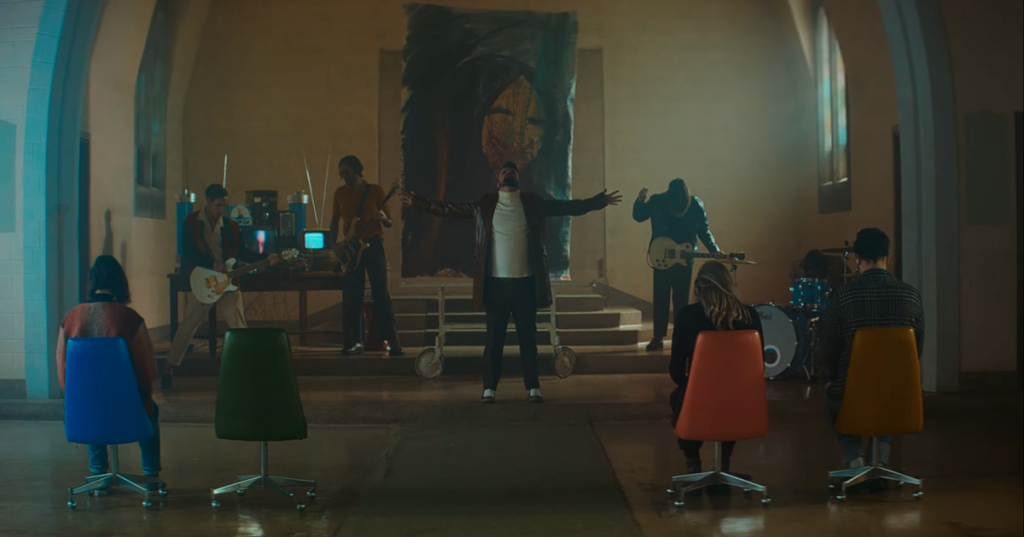For more than two decades, Silverstein has been delivering fast and melodic tunes that can’t be tied down to any one specific genre, except maybe “emo,” so says frontman Shane Told. This year, the band released their 11th studio album, Misery Made Me, serving up what some could say are their heaviest, most soul-barring songs to date. Recently, PopCulture.com had a chance to catch up with Told, from the band’s tour with Australian rockers The Amity Affliction. He shared some insight into the new album while also offering a take on the controversial practice of venues taking a cut of band merch, which has long been something artists have dealt with but many music fans only recently became aware of.
“It’s been really great,” Told said of the band’s current tour. “We’ve been on tour with the Amity Affliction, some of our really good old friends from Australia, and we’ve been trying to get together with them to package up with them for a really long time. So really happy it could finally work out. And the people are coming out in droves. Tickets are moving. People are really excited to see this package. We’re having a blast. Obviously, this isn’t our first tour back, but it is the first tour that really feels normal again.” This is not the first time the two bands have played together, but it is the first time they’ve done a joint headlining tour. “We’ve done some shows with them in Australia and also we did the Warped Tour with them at least twice. So yeah, our paths have crossed a lot with them,” he explained.
Videos by PopCulture.com
Silverstein originally hails from Ontario, Canada, and was part of the first wave of the early ’00s post-hardcore/screamo scene, which also included bands like Atreyu and Taking Back Sunday. Over the past 20 years, the bands from that era, who are still around, have typically done one of two things: (1.) Make the same music over and over because it’s what the fans like, or (2.) evolve. Silverstein is very much the latter. Their early albums, like When Broken Is Easily Fixed (2003) and Discovering the Waterfront (2005), have tunes the kids would call “all-timers,” but it is still very clear on Misery Made Me that the band is not trying to avoid growing up.
“We’ve always done whatever the f— we want, to be honest,” Told says of the band’s mindset. “We’ve never had a record company tell us what to do or what to write. That’s been really great, because I know that some bands that have been on certain labels haven’t had that freedom, and we always have. So any changes that people want to attribute to whatever label we’ve been on, I laugh because those are conspiracy theories and they’re not at all true.”
Speaking specifically of Misery Made Me, Told said, “I think with this album, when you talked about how it’s not negative, it’s more like positive aggression, I think you hit the nail on the head there because writing these songs during the pandemic, when we were in isolation and we were very depressed, very frustrated, pissed off, whatever words you want to use, we were feeling all those feelings collectively. And at different times the ups and downs that we all faced during the lockdown, which we had considerably worse in Canada, by the way, so it was really interesting when we got into a room together to record, the songs were really pissed off and aggressive, but we were really excited and actually really happy to be together and working on this, because we hadn’t seen each other.”
He continued, “So when we got in the studio, it was every day we’re having fun, we’re joking around, we’re working really well, we’re getting along better than we’ve ever gotten along, but the material was still very dark. So I feel like it’s this really interesting duality that maybe there’s something in there that you can’t really pick up on, but it’s there, where you can tell that we are at our best and we can tell that we are positive, but the subject matter isn’t, if that makes any sense at all.”
Comparing and contrasting Misery Made Me with their previous album, A Beautiful Place to Drown (2020), Told said, “I think [that] was a really strong record but not as heavy a record as this last one [2017’s Dead Reflection], definitely there’s a few songs on A Beautiful Place to Drown we could not have written this time around. They’re just too happy and too positive. That wasn’t in us this time when we were writing, but I do think one thing we’ve done over the last two records is we’ve spent so much more time and we’ve had a lot more reflection, I think, on the songs. Whereas before, it’s, ‘Okay, it’s a cool song. Record it. All right, there it is. There’s the song.’”
Told went on to explain, “Where this time, we’ve gone back and forth with things and we’ve talked about things and we’ve said, ‘Okay, what can we do to make this better? And how can we refine it? And is everyone really on board with this?’ And I think that those conversations, which can be very difficult conversations when you’re in a band, we hadn’t really had before. So now that we’ve been having them, I think it just makes the product… And I don’t like calling our music a product, but you know what I mean? The result, it just makes it a lot better and a lot more, I don’t know, just stronger than I think when it’s, ‘Okay, cool song. Yeah, let’s write it.’ And then it’s recorded in a day and we hadn’t given it not much thought.”
Finally, we asked Told his thoughts on the recently surfaced controversy surrounding venue merch cuts, which was sparked back in August when Australian metalcore band Alpha Wolf brought attention to it during a set. In the past two months, the practice of venues taking a percentage of band’s merch sales has led to a lot of discussion and criticism, with Against Me! vocalist Laura Jane Grace even blasting a venue for their expectation.
“It’s amazing this is just coming to light now, and maybe if everybody actually bonds together and says, ‘This is bulls—,’ maybe it’ll change,” Told said. “But dude, merch rate has been a thing as long as I’ve been performing, anywhere from 10 percent to sometimes 25 percent, even 30 percent. 15 percent to 20 percent is a pretty standard rate. That comes off the top every time you play, which is why merch prices are sometimes quite a bit high.”
Told then clarified that this is often the cause of higher merch costs, saying, “When people say, ‘Oh my God, why is this T-shirt 30, 35 bucks?’ Well, that’s because the venue is taking 20 percent off the top before the merch has been designed.” He continued, “People forget too, you have to get a designer you have to pay to design the merch, which is not cheap, and then you have to get this stuff printed and there’s all those costs, then it has to get shipped to wherever you are, and there’s those costs. And then you have to pay someone to sell it also, and then sometimes there’s taxes that are taken out of it. There’s credit card fees now, because most of the time people aren’t using cash anymore. It’s been pretty much now all a square reader, which they take a cut.”
He continued, “So I totally understand the frustration that Alpha Wolf and other bands have. It’s just funny because I’ve been frustrated for 22 years, man. This is not a new thing and this is just something, it’s always been the way it is and we’ve tried to get agents to negotiate it out and say, ‘Okay, can we get no merch rate?’ And that’s always a sticky point, where sometimes you can’t get it taken out.”
Fans have a couple more chances to catch Silverstein and The Amity Affliction, as the bands are playing in Montreal, QC on Saturday, Oct. 1 and in Toronto, ON on Sunday, Oct. 2. Tickets can be accessed by clicking here. Fans can also pick up physical copies of Misery Made Me, as well as official merch, at the band’s website.








